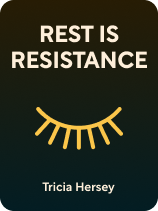

This article is an excerpt from the Shortform book guide to "Rest Is Resistance" by Tricia Hersey. Shortform has the world's best summaries and analyses of books you should be reading.
Like this article? Sign up for a free trial here.
What is grind culture? How has society’s relentless focus on productivity affected your life?
Tricia Hersey’s book Rest Is Resistance explores the concept of grind culture and its impact on society. She argues that this mindset, rooted in capitalism and white supremacy, has robbed us of essential human experiences and treats people like machines.
Read more to learn about the origins of grind culture and how it has shaped our modern world.
Grind Culture
Hersey begins her book by saying that grind culture is taking a severe toll on people both physically and spiritually. So, what is grind culture? Hersey uses this term for modern society’s relentless focus on productivity. She argues that—in addition to leaving people perpetually exhausted and unwell—grind culture has robbed us of essential human experiences like pausing, dreaming, and using our imaginations.
The author adds that grind culture is fundamentally toxic because it treats people like machines: It exploits the population for the economic gains of a few wealthy elites, then tosses people aside when they’re no longer useful. In the process, “the grind” destroys people physically, mentally, and spiritually.
(Shortform note: Experts believe that grind culture started to become popular in the 1990s and early 2000s. This happened because some Silicon Valley tech startups—companies that started from almost nothing and became enormously profitable—credited their success to company cultures that promoted work and productivity over everything else. The message spread through other companies that hoped to emulate the startups’ financial successes, and eventually through social media as influencers promised people they could achieve all their dreams if they just worked harder. Thirty years later, much of Gen Z began rejecting the grind mindset, saying it’s based on false promises that hard work will make you rich.)
We’ll discuss the origins of grind culture and how modern society indoctrinates us to believe that we must live only to work.
The Roots of Grind Culture
Hersey views grind culture as the intersection of capitalism and white supremacy. She says we must recognize, understand, and resist these two systems in order to reclaim our lives from grind culture.
How Capitalism Contributes to Grind Culture
Hersey says capitalism has profoundly shaped modern society’s values and expectations, and led directly to the emergence of grind culture.
At its core, capitalism is driven by the pursuit of profit and economic growth. While that doesn’t seem harmful in theory, in practice it creates constant pressure to achieve, produce, and excel at any cost. This relentless drive for efficiency and productivity has created a society that rejects the idea that people have inherent worth; instead, modern society measures people’s value by their wealth and professional success.
(Shortform note: In contrast with how Hersey portrays this mindset, some argue that capitalism doesn’t teach that simply that having more money means you’re a better person; rather, your wealth indicates how much value you’ve contributed to the world. Rabbi Daniel Lapin makes this point in Thou Shall Prosper, saying that your money is a direct reflection of yourself. This is because you earn money by selling your time, effort, and skills to other people through your work. Therefore—at least in theory—the more valuable your work is and the more work you do, the more money you’ll have.)
Hersey says that this mindset has particularly taken root in academia. Students are often expected to maintain high standards of academic achievement while juggling multiple other responsibilities like extracurriculars and jobs. Their parents and teachers constantly reinforce the message that this is all necessary because the students need to make themselves look good to prospective universities or employers—after all, it’s only a matter of time before they’ll be competing for limited openings, whether in higher education or in the workforce.
This atmosphere of constant pressure and competition normalizes exhaustion and disconnection, and teaches students that their well-being is a necessary sacrifice on the path to success. The academic grind, therefore, serves as indoctrination into grind culture and a training ground for the post-school world.
(Shortform note: Recent research supports the idea that academia—whether intentionally or not—pushes many students so hard that their health suffers from the strain. For instance, a 2023 meta-analysis (a report that compiles and analyzes numerous research studies) found that nearly 35% of graduate students worldwide are suffering from clinical anxiety. The researchers also note that anxiety is often the first symptom of other disorders such as depression and obsessive-compulsive disorder. This suggests that the grad school is putting excessive pressure on students, to the point that more than a third of them are suffering serious and potentially long-lasting harm.)
How White Supremacy Contributes to Grind Culture
Hersey explains that the foundation of white supremacy is the refusal to see certain people as people. Instead, the white supremacist mindset views nonwhites as some sort of inferior species more akin to animals; creatures who not only can be exploited, but should be exploited.
As such, white supremacy is an ideology that values results over (some) people’s well-being. For instance, if an enslaver works a slave to death, the enslaver would most likely react as if they’d broken a tool, rather than acknowledging that their actions had killed another human being. Hersey says that these white supremacist principles of valuing results and devaluing people are also central to grind culture.
(Shortform note: It’s commonly assumed that racist policies like slavery came about because of racist beliefs, like the idea that Black people are a lesser species. However, in How to Be an Antiracist, historian Ibram X. Kendi says that it was actually the other way around: Powerful men invented the idea of race—and therefore racism—to justify their policies. Kendi explains that the earliest known book dealing with race is The Chronicle of the Discovery and Conquest of Guinea, written in the 15th century. In it, the Portuguese author Gomes de Zurara portrayed Africans as savages who needed to be saved by the superior European race. Zurara did this as a post-hoc justification of Prince Henry the Navigator’s decision to bring Portugal into the slave trade.)
Furthermore, although grind culture is not overtly racist—indeed, many white people are also victims of it—Hersey says that the grind impacts Black people more severely. There are two main reasons for this: first, because society values Black lives less than white lives, and therefore Black people are more likely to have their needs ignored and their problems dismissed. Second, because Black communities tend to have lower incomes than their white counterparts, so people have to work longer hours in order to support themselves.
As an example of this racial imbalance, Hersey discusses the sleep gap: Research shows that Black people in the US tend not to get as much sleep as white people do, largely because they need to work longer hours to sustain themselves. This lack of good-quality sleep severely impacts Black Americans’ health; Hersey’s own father worked himself to death at the age of 55.
(Shortform note: To further illustrate Hersey’s example: The Centers for Disease Control and Prevention (CDC) recommends that adults get at least seven hours of sleep each night in order to stay healthy. In 2014, the CDC conducted a study on the sleep habits of US citizens. The study concluded that about 33% of white Americans don’t get seven hours of sleep a night—for Black Americans, the number surges to 46%, meaning nearly half of that demographic isn’t getting enough sleep.)
| Why “Equal” Doesn’t Always Mean “Fair” Grind culture impacts certain groups more severely because those groups are already at a societal disadvantage. As sociologist Matthew Desmond explains in Evicted, Black Americans are one such group: Even today, when overt racial discrimination is illegal, they continue to suffer from the effects of the US’s racist history. Perhaps the best example of this cycle of discrimination was President Franklin Roosevelt’s “New Deal” program. The New Deal provided opportunities for people to take on federally insured mortgages (rather than having to use their own assets as collateral), allowing many Americans to become homeowners for the first time. However, the government decided that impoverished Black neighborhoods—commonly called “ghettos”—were too risky to insure, and therefore most Black Americans could not benefit from this policy. In short, Black communities were destitute and dangerous because of past discrimination, and that became an excuse for continued discrimination. Desmond concludes by saying that equal treatment is not fair treatment when some people begin at a disadvantage. To illustrate the point with a metaphor, it would be like if you tried to join a game of Monopoly after other players already own most of the properties; even though you’re all playing by the same rules, the game would be distinctly unfair to you because you have very few resources and very few opportunities to get more. |
Exercise
Take a few minutes to consider how grind culture is impacting you.
- Which of the effects of grind culture that Hersey describes are you personally suffering from, if any? For instance: Perhaps you’re always tired, you feel guilty or anxious whenever you take time to rest, or you have low self-esteem because you feel like you aren’t accomplishing enough.
- How might your life and overall well-being change if you had more time to rest? For example, maybe you’d feel healthier, more energetic, or happier. On the other hand, maybe you already feel well rested and don’t believe that more rest would be beneficial for you.

———End of Preview———
Like what you just read? Read the rest of the world's best book summary and analysis of Tricia Hersey's "Rest Is Resistance" at Shortform.
Here's what you'll find in our full Rest Is Resistance summary:
- How modern grind culture hurts you physically and spiritually
- The 3 myths that grind culture instill in society
- How rest can be used as a radical form of resistance






